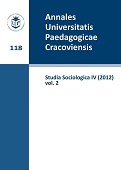Making Sense of Their Own Mobile Identities in Internally Borderless Europe: Europeans, Poles, ‘Bread’ Migrants, Catholics...
Making Sense of Their Own Mobile Identities in Internally Borderless Europe: Europeans, Poles, ‘Bread’ Migrants, Catholics...
Author(s): Ciupijus ZinovijusSubject(s): Social Sciences
Published by: Wydawnictwo Uniwersytetu Komisji Edukacji Narodowej w Krakowie
Keywords: Central and Eastern Europe; EU enlargement; migration; orientalism
Summary/Abstract: EU enlargement and the intra-European labour mobility which followed it, have been conceptualized within two competing discourses. The first one reflects the view of the EU Commission: it has hailed post-accession mobility as a fulfilment of the idea of a borderless Europe. In this benign interpretation, mobile Central and Eastern Europeans have been viewed as the new citizens of Europe empowered by a newly acquired freedom of movement. The alternative discourse could be found in critical sociology and geography. It argues that that post-enlargement mobility has many parallels with previous migration waves from Central and Eastern Europe (McDowell 2009). Far from being recognized as equal citizens, Central and Eastern Europeans have been treated as ‘Eastern’ others, for example, at the level of the Western European mass media (Light, Young 2009). While diverging in their evaluations – the inclusion versus continuous exclusion of Central and Eastern Europeans, both discourses are concerned with what is known in social theory as structures. In contrast, this article looks at the structural constructions (the East-West boundaries versus open borders) from the perspective of the life experiences of migrants themselves. Putting the agency of Central and Eastern Europeans firmly at the centre of the analysis, the article uses original qualitative data to analyze how Central and Eastern European migrants in the UK articulate their cultural identities and reflect on shifting boundaries of Europe.
Journal: Annales Universitatis Paedagogicae Cracoviensis. Studia Sociologica
- Issue Year: IV/2012
- Issue No: 2
- Page Range: 56-71
- Page Count: 6
- Language: English

